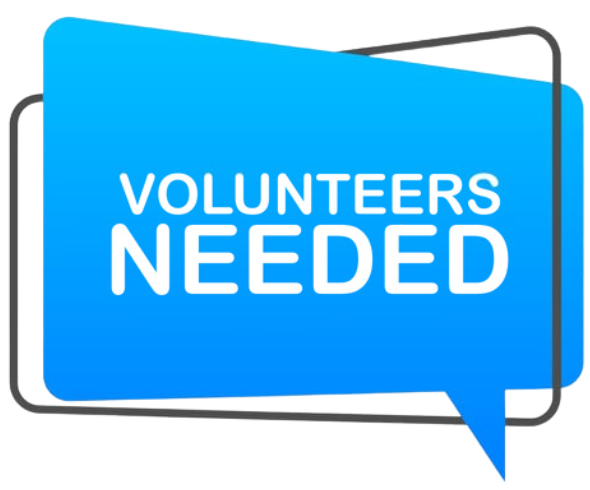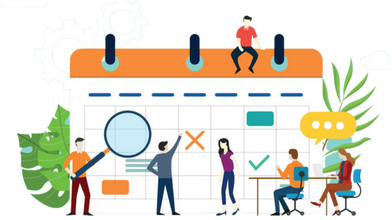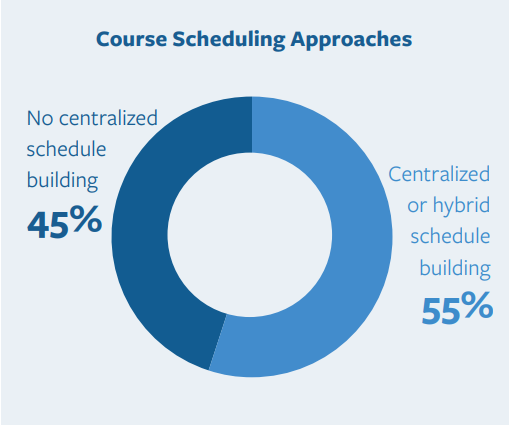Commentary
 | It has taken us a minute to get to this point. However, I am eager to share that we are ready to test the AACRAO Transfer Designation Assessment based on the recommendations from the Transfer Student Success Work Group report "Recognition of Excellence in Supporting Transfer Student Success." You can volunteer to beta-test the assessment
here. |
AACRAO Research Update
The Modern Registrar: Reflections from the Field
|

| Nine volunteers, who currently serve in a range of administrative leadership roles at various institutional types, participated in a 75-minute roundtable discussion on the role of the modern registrar in July 2022. Participants responded to
questions regarding the definition of student centricity, the costs of—and responsibility for—not being student-centric, the role of the registrar in policy |
enforcement, and the impact of technology on serving the needs of learners. This white paper shares some of the key findings from the June survey and highlights insights and analysis from the roundtable participants on how the modern registrar's role, focus, and responsibility are evolving. Themes in their collective responses
included, but were not limited to, the following:
|
- Placing the student at the center of decision-making around policy, practice, and the use of technology
- Being aware of the use of profession-specific terminology
- Understanding the registrar's role as an educator
- Using empathy to understand a student's perspectives
- Leveraging data to inform student-centric policy and practice
- Highlighting the understanding that there is no "one-size-fits-all" student experience in higher education
Undergraduate Class-Scheduling Practices
| This benchmark report highlights
factors related to building the class schedule, characteristics of student-centric schedules, and the use of data to inform the class schedule. These factors are critical to understanding how the class schedule does or does not serve students.
Key findings include: |  |
- At 78% of institutions, faculty preference remains a strong influence in determining when, where, and in what delivery modality undergraduate classes will be offered.
- Only 27% of respondents agree or strongly agree with the statement, "Our institution engages in student-centered class scheduling."
- Fewer than half of respondents have and use undergraduate class-scheduling software.
Upcoming Research Webinar
 | Register for the upcoming panel-based webinar on November 9 to learn more about the undergraduate class-scheduling practices report. Our panelists reflect several different roles in undergraduate education. |
Looking Ahead
- The November 60-Second Survey will focus on using degree audit and education planning technology for undergraduate and graduate students.
- The Chief Admissions Officer Career Profile report is in deployment, and we anticipate a report by the end of this year.
- In early spring, we will partner with UPCEA and Modern Campus on a joint research project of mutual interest.
- The first 60-Second Survey of 2023 will be in partnership with Adastra.
- We will deploy the 2023 Chief Enrollment Management Officer Career Profile Survey mid to late spring.
Current Higher Education Research and Related Topics
Article Examines Surge in Undergraduate Enrollment in Fully-Online Institutions
An article in Inside Higher Ed examines the growth of high school graduates planning to attend online-only institutions. Some key points include:
- In 2020, just 0.28 percent of high school seniors planned to attend an online-only program. In 2022, that number reached 0.72 percent.
- One large online-only institution identified four factors that are likely driving enrollment growth:
- Online learning may be better for students with health issues.
- Online learning may be better for students with childcare, work, or other responsibilities.
- Online learning may be more cost-effective for students.
- Online learning may be better for students who only get a degree as a secondary goal.
In-Depth Studies Of Demographic Data Show Interesting Results
Two studies released by Common App (available here and here) using data submitted through the app examine detailed race and ethnicity data to examine demographic trends in college applications. These studies went far beyond the standard race and ethnicity categories
used by the U.S. Census Bureau. There was a strong emphasis on unpacking the details of ethnic identities and multiracial composition. These are in-depth reports with a great deal of detail. Key findings include:
- Applicants indicating India as their exclusive background will soon become a stronger plurality of Asian applicants going forward.
- Diversity is growing, even among traditionally monolithic groups such as white applicants.
- A majority of multiracial applicants identified partially as white (89%).
- Meaningful differences within each standard racial/ethnic category in terms of indicators of resources, college readiness, and application behavior persist.
More than 75% of Americans See Public Colleges as Financially Out of Reach
The rapid tuition increases at public colleges now have a majority (52%) of respondents stating that in-state undergraduate education is not affordable. That is one of the major findings in a new survey report from Morning Consult.

Only 24% of respondents stated that community colleges were not affordable, while 72% said private for-profit universities were not. Further data in the report supports the assertion that these perceptions of cost affect women and minority applicants
to a greater degree.
New Report Highlights the Efforts of Community Colleges to Meet Basic Student Needs
| During the pandemic, community college students' basic needs challenges became more evident. The 2021 Community College Survey of Student Engagement (CCSSE) explores these basic needs areas. The report focuses on food and housing insecurity and how community colleges attempt to address these issues. Some key findings include: | .png?sfvrsn=135a212c_4) |
- 29% of respondents fell into the food insecure classification, and 14% fell into the housing insecure classification.
- One out of seven students reported not eating because they lacked money for food.
- More than 25% of students reported having trouble paying their rent or mortgage.
- Students with dependent children report higher levels of food and housing insecurity.
|

National Survey Indicates Potential for Large-Scale Turnover of Regional Admissions Counselors
The 2022 survey by the National Association of Regional Admission Counselors seems to indicate that many regional admissions counselors plan to leave
their jobs. 21% of respondents are considering another position in higher education, and 26% are considering moving outside of higher education. Other key points include:
- Paths to promotion seem limited, with half of the respondents seeing no clear path.
- More than 50% of respondents have a master's degree.
- 73% of respondents identify as female.
- 47% of respondents said they have taken on additional responsibilities due to the pandemic.
Early Alert Systems for Community College Students May Not Live Up to Potential
A new report from New America attempts to fill
in some of the research gaps regarding the impact of Early Alerts Systems (EAS) at two-year institutions. Many college leaders see EAS as a high-impact retention tool, citing it as a "top-five very effective strategy," but supporting research is limited.
The report also explores racial discrimination in the use of EAS. It identifies five challenge areas (and recommendations for improvement). Those five areas are:
- Uncertainty about how to navigate procurement
- Low faculty buy-in
- Failure to supply appropriate support services
- Inadequate evaluation of EAS data
- Difficulty shifting the use of EAS during the pandemic
Conferred PhDs Dropped by 5.4% in 2021
The Survey of Earned Doctorates from the National Science Foundation reports a 5.4% drop in conferred PhDs from 2020 to 2021. While a final report is not yet available, the survey data tables and technical notes are now published.
Report Examines How Institutions are Changing Course Scheduling Practices
Ad Astra has released a new report on how institutional leaders are changing how they
approach the course schedule to meet the needs of today's learners. The survey reached nearly 700 college leaders and combined real scheduling data from 150+ partner institutions. Some key findings include:
- Learners are taking fewer credit hours, and fewer learners are attending full-time.
- Overall, students took 14.6% fewer credits in the fall of 2021 than two years earlier.
- Drop, failure, and withdrawal rates have increased with the increase in online learning.
- Only 55% of institutions use a centralized approach to scheduling that can build consistency around course scheduling expectations, processes, and outcomes.
|  |
Survey Examines Student Opinions on Supreme Court Case Involving the Legality of Race-Conscious College Admissions
A survey of 1,002 current or prospective undergraduate and graduate students conducted by BestColleges examined student
opinions about affirmative action in college admissions. This survey took place ahead of the U.S. Supreme Court oral arguments on October 31 concerning the legality of race-conscious college admissions. Some key takeaways from the report include:
- Almost half of the students (45%) agree that banning the use of race/ethnicity in college admissions is fairest. Only 24% disagree.
- More than one-third (38%) of Black respondents support affirmative action, and one-third (33%) are against it.
- College men (40%) are more likely than women (35%) to support affirmative action.
- More than half of students (56%) believe colleges should take responsibility for increasing the representation of historically excluded groups on campus.
- More BIPOC students (30%) than white students (24%) report negative impacts of race-conscious college admissions.
- Roughly one in three (34%) trust the Supreme Court to make an appropriate decision on affirmative action.